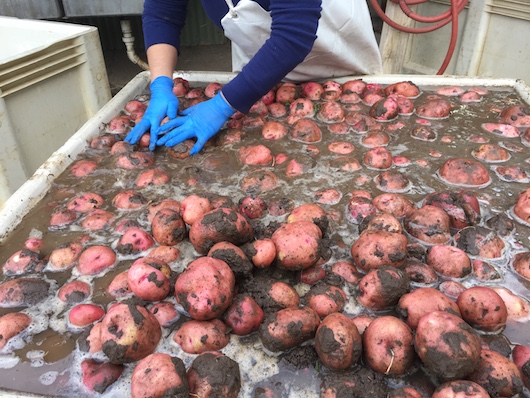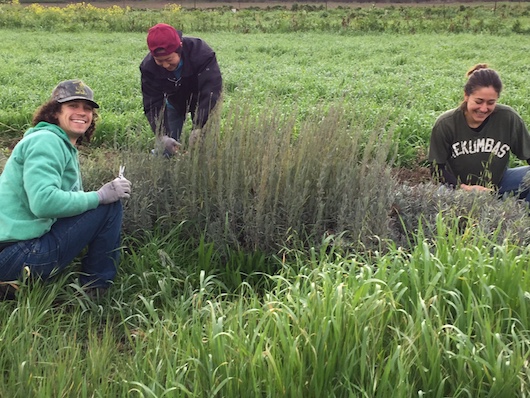
Soaking potatoes before washing them ––
I had the opportunity last week to join some interesting conversations about nutrition and health — and their intersection with organic agriculture. We reported in this newsletter previously that researchers are increasingly finding that people eating more organic food have a reduced risk of cancer. Of course, other healthy behaviors, in addition to eating organic food, are obviously also very important to staying healthy — things like getting exercise and not smoking tobacco. But it turns out that healthy behavior (over which individuals have some control) may only be a factor of about 30% in terms of influencing your health outcomes.
There is growing recognition that social and economic factors shape an individual’s health with an even greater influence (40%) than factors under individual control. For example children born to parents who have not completed high school are more likely to live in an environment that poses barriers to health such as lack of safety, exposed garbage and substandard housing. Other things, like economic stability, food access, community engagement, education and even the actual zip code in which you were born can predict your health outcomes and if you will be more or less challenged than average.
Several reports came in from different institutions and fields of study at last week’s Ecological Farming Conference, attended by many of us from Full Belly Farm. Dr. John Reganold (Soil Science and Agroecology at Washington State University) helped his audience conceptualize the challenges and benefits of organic agriculture by presenting a set of metrics, concluding that organic systems provide many benefits in terms of sustainability. His overall conclusion was that although organics doesn’t necessarily get top scores on every single measure, there are overwhelming benefits including evidence that organic food is more nutritious.
A report released at the Conference by California Certified Organic Farmers (CCOF Foundation), titled Roadmap to an Organic California; Benefits Report, cited data that residents in agricultural-intensive regions have 69 times more risk of poisoning from exposure to pesticide drift. Hispanic children are 91% more likely to attend schools with the highest pesticide exposure. Because organic agriculture bans synthetic pesticides, it protects children and farm workers from pesticide exposure. The fact that antibiotics aren’t used routinely in organic meat production, also provides significant public health advantages.
Perhaps one of the most interesting conversations on this topic included the First Nations Development Institute. A-Dae Romero-Briones leads the Food Systems Initiative at the Institute. She eloquently described the way that strong community networks and food traditions have been part of First Nation sustainable food systems. Because so many of the links have been broken, Native families now often don’t have access to a nutritious diet. Food prices are inordinately high in Indian country and Cooperative Extension and the U.S. Department of Agriculture don’t even consider wild harvesting or hunting and gathering, which are practiced in Indian Country, to be a part of agriculture. A-Dae’s program supports projects that help to rebuild traditional food systems in Indian Country.
Connecting some of these dots, I remembered that high school graduation is an extremely important predictor of overall health outcomes for an individual. High school graduates have less chance of being in prison, greater financial stability as adults and fewer health problems. Clearly, hospital executives and the family doctor should get involved in making sure that their young patients are staying healthy and going to school. Year-round employment of farm workers, something that we strive for at Full Belly Farm, may also make it more likely that the families with parents working on our farm can ensure that their kids graduate from high school. We have long been supportive of the local Esparto High School, especially through grants made from funds raised at the October 5th Hoes Down Harvest Festival.
This way of thinking about nutrition and health is a little more subtle than simply looking at the diet that you eat and the exercise that you get. Perhaps it isn’t too great of a stretch to say that by supporting organic agriculture, you may also be supporting improved public health in a much broader way than you realized!
Thank you all so much for being part of the Full Belly Farm CSA program.
Blessings on your meals.
—Judith Redmond

Interns dead-heading the lavender. Ben (left) quipped that it is too bad you can’t have a scratch and sniff email!
